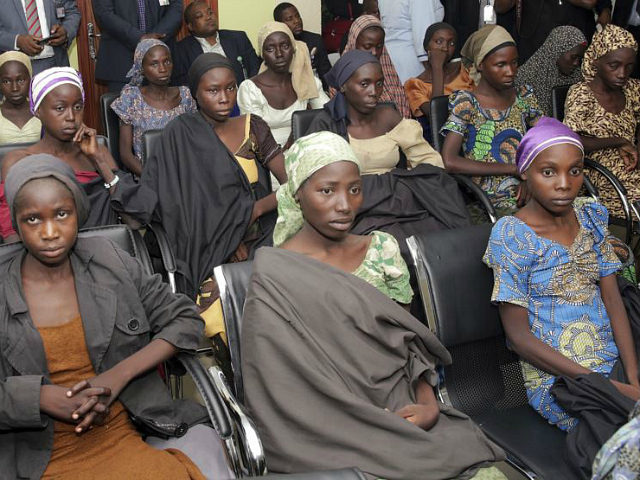The Nigerian government initially confirmed, but later denied, that 21 schoolgirls who were kidnapped by the Islamic State branch Boko Haram from Chibok, Nigeria, were recently released in a prisoner swap for four imprisoned high-ranking jihadis.
When the girls were freed last week, Christianity Today noted that the liberation marked the first time any of the schoolgirls have been released, adding that some of them did escape.
Of the estimated 276 predominantly Christian girls who were taken captive by Boko Haram jihadists in April 2014 from Chibok in northeastern Nigeria’s Borno state, 197 remained unaccounted following the release 21 young women, the majority of whom have had children after being raped and forced into marriage by their captors.
The Swiss government has confirmed that it acted as an intermediary between the Nigerian government and Boko Haram during negotiations for the release of the schoolgirls.
According to the office of Nigerian President, Muhammadu Buhari, his administration is negotiating the release of an additional 83 schoolgirls.
A security official told the BBC several militants were freed in a swap — but the government later denied this, reported the British news outlet last week, adding that the security officials also said, “Several top-level Boko Haram detainees were taken to a meeting point close to the Cameroon border Under the supervision of the ICRC, the girls were then released and the militants were handed over.”
Christianity Today added that the girls were liberated in a trade for four imprisoned Boko Haram jihadis.
This week, The Daily Beast cited individuals with knowledge of how Boko Haram operates, also suggesting that there was a prisoner swap involved.
“It’s hard to come to terms with the fact that the schoolgirls’ release did not involve a prisoner swap,” says Bala Chabiya, co-founder of the Hands of Love Organization, an initiative that works with rescued victims of Nigeria-based ISIS branch.
“The militants have over time demanded for the release of fighters in exchange for the schoolgirls, and I tend to believe that is what happened,” added Chabiya, who has counseled a large number of Boko Haram victims.
Last Thursday, Nigerian presidential spokesperson Garba Shehu reportedly wrote on Twitter that the liberation of the 21 schoolgirls is “an outcome of negotiations between the administration and Boko Haram brokered by the International Red Cross and the Swiss government,” adding that “negotiations will continue” for the release of the remaining prisoners.
Nigeria’s Information Minister Lai Mohammed denied that a trade had taken place.
“This is not a swap, it is a release [of the hostage women], the product of painstaking negotiations and trust on both sides,” declared Mohammed. “As soon as the necessary confidence was built on both sides, the parties agreed on the date and the location of the release of the 21 girls.”
News reports, citing an article from Nigerian newspaper Vanguard published last Sunday, noted earlier this week that about 100 schoolgirls, or nearly one-third of the total 276 who were kidnapped, refuse to leave their Boko Haram captors.
Experts say that some of the girls may be unwilling to leave because of fear that they will be labeled “Boko Haram wives,” a designation that will prompt abuse and reflection from conservative communities in Nigeria.

COMMENTS
Please let us know if you're having issues with commenting.